FEATURES
Dr. Eliot Tokar: The Novel Coronavirus Through the Lens of Tibetan Medicine
It has been more than two years since Buddhistdoor Global last interviewed Dr. Eliot Tokar, an American doctor of traditional Tibetan medicine who studied with Dr. Yeshi Dhonden (former personal physician to the Dalai Lama) and the renowned Tibetan doctor and Nyingma lama Dr. Trogawa Rinpoche.* Since then, the world has changed drastically, with the SARS-CoV-2 novel coronavirus outbreak affecting our everyday lives in ways previously unimagined.
Dr. Tokar lives in New York City, the initial epicenter of the US novel coronavirus outbreak, in the borough of Queens, which was the epicenter of the city’s pandemic crisis. In this conversation, Dr. Tokar shares his insights into how Tibetan medicine and Buddhism can make a positive contribution to this global health crisis.
Buddhistdoor Global: In your experience, have people shown an interest in dealing with the novel coronavirus through natural forms of healthcare such as Tibetan medicine?
Eliot Tokar: As a Tibetan medicine doctor, my experience is that people have naturally become more aware of the importance of maintaining their health and strengthening their body’s immune response during this pandemic.
Tibetan medicine begins with the idea that we must clearly define health before classifying and finding remedies for disease. That definition is rooted in an understanding that the basis of health are the laws that relate to all natural phenomena. Tibetan medicine then clearly describes three fundamental principles of function—with 15 subcategories—that are the foundation for the functioning of our body’s organs, systems, and substances, as well as our mind. This approach allows Tibetan medicine to evaluate a person’s strengths and weaknesses and how an illness can affect a given individual. If we better understand the fundamental principles of health, we have a better chance of improving our physical resilience, such as our immune function. Then, if we do become ill, our body will have the means to reduce the likelihood of the onset of worsening symptoms. Tibetan medicine also has the means to address health problems that may arise.
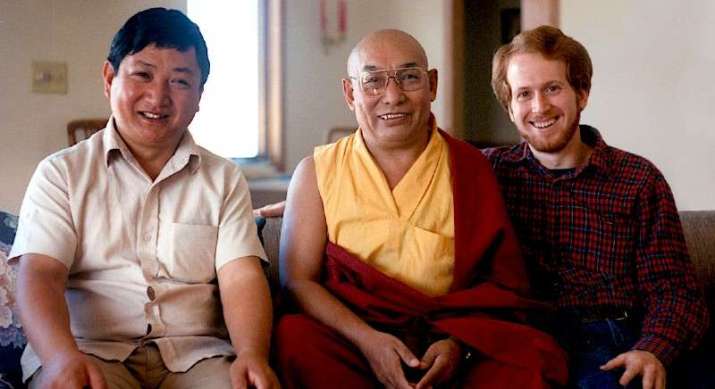 Dr. Eliot Tokar, right, with his first Tibetan medicine teacher, Dr. Yeshi Dhonden, center, along with Dr. Lobsang Tenzin, left, in 1986. Image courtesy of Eliot Tokar © 2019
Dr. Eliot Tokar, right, with his first Tibetan medicine teacher, Dr. Yeshi Dhonden, center, along with Dr. Lobsang Tenzin, left, in 1986. Image courtesy of Eliot Tokar © 2019BDG: The US has suffered from a lack of testing resources—can traditional Tibetan medicine offer anything additional when it comes to diagnosing COVID-19?
ET: Both biomedicine and traditional medicine have significant clinical resources with which to aid patients in this pandemic. Hopefully, we can learn to work together, share information, and complement each other’s approaches for the betterment of all.
One characteristic of biomedicine is its reductionist approach, which seeks to interpret biological systems as the sum of their parts. That methodological reductionism excels in isolating and classifying microbes such as viruses at the molecular level. As such, epidemiological tests are most useful in distinguishing SARS-CoV-2 infections from other coronaviruses.
Traditional medical systems like Tibetan medicine have long recognized that infective agents that are invisible to the human eye have a role in infectious disease. Traditional Asian medicines excel in their emphasis on the individualized assessment of a patient—i.e., differential diagnosis. This sophisticated diagnostic approach allows us to identify the specific effects that a given illness has on a patient that distinguishes it from similar pathology in other patients. In that way, we can tailor care to meet the individual needs of a patient as opposed to applying virtually identical treatments to all patients with a given disease.
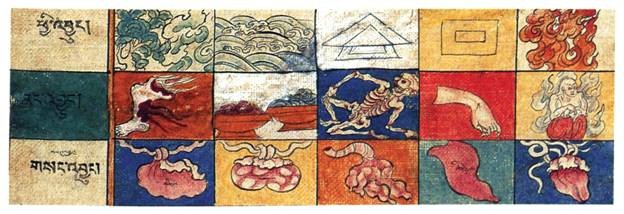
Illustration of connections between Tibetan Medicine and astro-science. From men-tsee-khang.org
In the US, and especially in Asia, traditional Asian medical disciplines—such as Tibetan medicine, Chinese medicine, Ayurveda, and so on—have worked to contribute to prevention and patient care during this pandemic. Biomedical intervention is most important once a patient has a severe onset of the COVID-19 virus and especially if they require intensive care or life support. However, biomedicine is more limited in what it can offer to people who are healthy but are trying to avoid becoming infected, those who are infected but asymptomatic, individuals experiencing initial symptoms (e.g. respiratory or fever symptoms), or to patients who have been hospitalized and are discharged with debility. In these cases, traditional Asian medicine most certainly has something useful to contribute.
In addition to helping individual patients, we can assist in reducing the number of people who become seriously ill and require hospitalization and thereby reduce the cost of care. Therefore, this kind of healthcare is additionally useful when biomedical resources become limited, as has too often been the case in many countries. In Asia, traditional medicine is also being used in some hospitals, along with biomedicine, to treat patients with more advanced symptoms of this virus.
BDG: How do you approach treatment for a respiratory virus such as COVID-19?
ET: COVID-19 is a new virus affecting humans, so all healthcare professionals are learning and doing research while treating this disease. But epidemic illnesses have occurred in Asia in both ancient and modern times. Therefore, traditional medical disciplines such as Tibetan medicine have a wealth of clinical information upon which to base their healthcare approaches to this pandemic. To figure out how to cope with a disease newly introduced into the human population like COVID-19, Tibetan medicine doctors have applied scholarly as well as clinical methods.
Tibetan doctors first examined Tibetan medical texts to find the correct category for this new virus within our unique discipline. Doctors then worked to determine the manner of infection, the characteristics of the disease, and then to see if these conformed with earlier examples of epidemic infections. Tibetan doctors took note of the etiology of the disease and how the disease takes root and spreads in the body. From that basis, clinical protocols regarding appropriate dietary and behavior/lifestyle changes and the use of Tibetan herbal medicines were developed and then put to the test clinically in Asia. Some of my Tibetan colleagues in China and South Asia readily shared this research with me. Their collegiality helped me determine how to approach COVID-19 if I encounter it in my practice.
The foundational texts of Tibetan medicine, The Four Medical Tantras (Gyü Zhi), originate from the eighth century. Dr. Khenrab Gyamtso has detailed how in those texts among the 1,002 illness categories identified, one describes epidemic infectious disease; COVID-19 fits into this category. These diseases are discussed, based on their etiology, in the four chapters dedicated to infectious disease and 18 chapters regarding virulent infectious disease.
These texts describe the causative factors of viral diseases based on Tibetan medicine’s ecological and integrated mind-body view of health. These potential causes include an abnormal alteration in (seasonal) climate, physical exhaustion due to excessive exertion, the contagious transmission of illness, contact with toxins and poisons, extreme rage and fear, severe mental stress, and excess materialism and greed. It also includes the consumption of unsuitable or contaminated foods that cause infectious diseases. Many of these conditions exist in the 21st century and it is now well known that the direct cause for COVID-19 and other recent pandemic illnesses, such as SARS-CoV-1, jumping to humans is the sale and consumption of wild animals.
In addition to following essential public health procedures like wearing masks and social distancing, there are basic rules regarding behavior, lifestyle. and diet that can aid in improving immune response during such a pandemic. Behavior/lifestyle recommendations include getting enough sleep and rest but not to excess, and maintaining regular eating, sleeping, and bathroom habits. Dietary suggestions include avoiding foods that are weakening, such as those that might encourage infection, for example sugar and artificial sweeteners, as well as overly rich foods that are hard to digest and can harm liver function. Foods to be avoided also include large amounts of dairy products and meat, foods that are very sweet or sour, processed foods, chemical food additives, non-fresh foods, and alcohol and other intoxicants.
Some of the clinical protocols designed by Tibetan doctors focus mostly on respiratory infections typical of this illness. More complex clinical procedures have been designed to address the different stages of this viral infection, taking into account the rehabilitation of patients after infection.
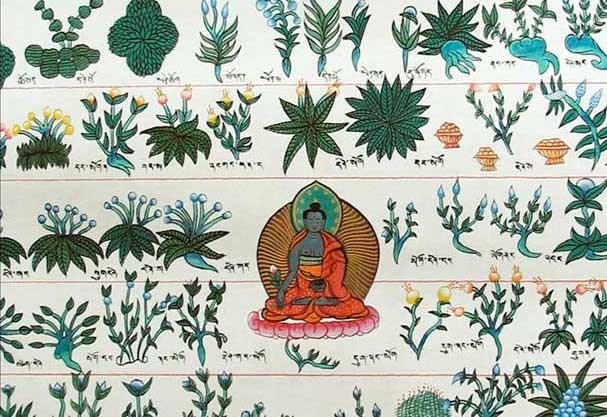
Healing plants in Tibetan medicine. Image from tibetan-buddhist-art.com
Tibetan herbal compounds used in these protocols include those that address fevers and infections and febrile conditions that are specifically related to respiratory infections. Other herbal medicines support proper respiratory function, liver function, and remove pathological heat, infection, and inflammation from the blood, tissues, and nerves. Herbal medicines to maintain proper digestive function and to strengthen metabolism and assimilation may be prescribed. Given the kind of physical exhaustion and mental stress that can result from the COVID-19 infection, herbal medicines that support overall circulatory function, protect the heart, and promote mental calm can also be employed. For more serious cases, complex formulas—based on Vedic science—are utilized based upon the determination of a Tibetan medicine doctor.
Only two of the people under my care reported coronavirus-related symptoms where biomedical testing later confirmed COVID-19 infection. One person with a history of Lyme disease recovered in about 1-1/2 weeks. The second, who suffers from fibromyalgia, took about 3-1/2 weeks to recover using Tibetan herbal compounds that I recommended. When the latter individual took a subsequent COVID antibody test, their MD noted that among those patients that the physician had seen who had not been hospitalized, this patient had the most significant immune response. One cannot make a solid conclusion from just one case, but it is the general experience of Tibetan doctors that patients who follow Tibetan medical approaches tend to develop improved immune function and blood quality relative to their age and state of health.
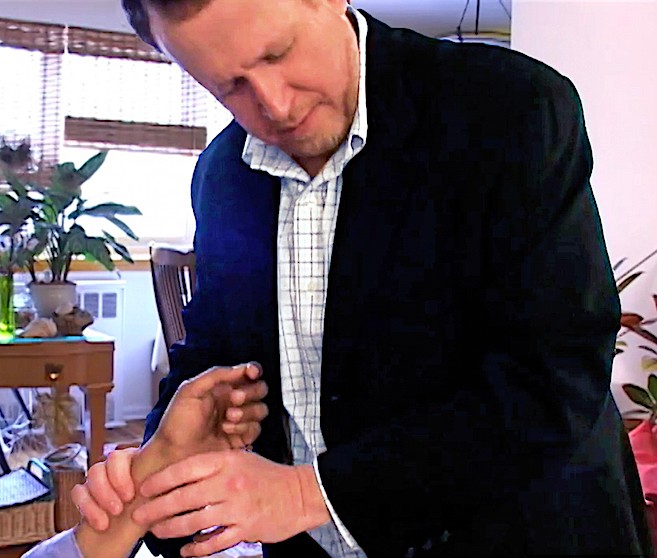
Dr. Tokar taking a patient's pulse according to the Tibetan medicine tradition.
Image courtesy of Eliot Tokar © 2020
BDG: Can Tibetan medicine help to address the emotional impact of the global health crisis on individuals?
ET: Tibetan medicine considers the mind and body to be intrinsically interdependent, so we understand the process by which stress can cause both mental and physical problems. Specifically, mental and emotional distress can lead to physical illness, while physical illness can perturb the mind. Many of these complex conditions can be helped by Tibetan medicine. But it is also important for people affected by such problems to work to build emotional, intellectual, and spiritual health.
Traditionally, Tibetan medicine is regarded as separate and distinct from Buddhism. But, as a culturally Buddhist-based medical system, Buddhism is integral to Tibetan medicine’s philosophical view. Therefore, Tibetan medicine recognizes the importance of maintaining awareness of the mind’s relationship with external phenomena.
One fact that creates anxiety for many people during a pandemic is that the fear of sickness and death is omnipresent. It can lead to a powerful desire for vestiges of normalcy, like being able to socialize or eat in a restaurant, no matter what the risk. To help people cope with this stress is the essential Buddhist understanding that impermanence is inherent to our existence. Buddhism teaches us to accept that all occurrences, whether material or mental, continuously change and are subject to decline and cessation. As with past crises, this pandemic will eventually be resolved. New challenges will arise in the future. Change is the nature of existence.
We must strive to maintain a sense of equanimity and generate compassion for those who are suffering. The Tibetan Buddhist tradition has many meditation practices that can aid an individual in achieving this goal. These include simple breath purification practices that can be performed by anyone. For Buddhists, there are practices such as tonglen that allows us to develop bodhicitta wherein we can attain awakening, empathy, and compassion for the benefit of all sentient beings, and samatha practice directed toward developing a tranquil and calm mind.
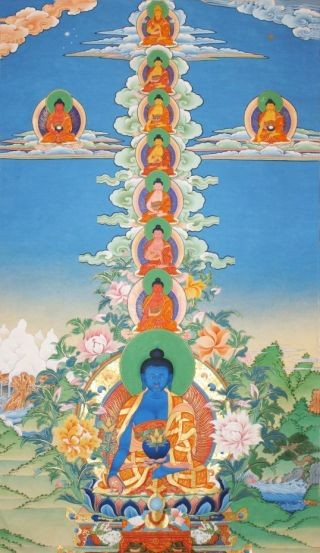
The Medicine Buddha. From fpmt.org
Combating ignorance is also vital to avoiding mental and emotional stress. We have seen how the spread of misinformation and conspiracy theories regarding this pandemic has increased anger and fear. Therefore, we must seek to understand the actual causes of the current situation. Any problems that prosperous countries like the US have had in adopting and funding public health measures necessary to control the virus result from human behavior negatively affected by the three mental poisons (kleshas), defined by Buddhism as materialism, aggression, and ignorance. To counter this, we need to develop an understanding of how ignoring the laws of nature led us to this crisis. Educating ourselves about which public health measures and personal habits can protect us from becoming infected is also essential to giving us a greater sense of confidence and calm.
Finally, we must act as citizens to insist that governments behave ethically: adopting and funding the public health and healthcare measures that are required to address this problem. Wealthy nations must help fund healthcare efforts in countries with more limited economic and healthcare resources. This crisis can produce a positive result if it educates us about the global interdependence that exists regarding environmental and health issues.
BDG: Do you have any advice for our readers during this difficult time?
ET: Do whatever is needed to secure your situation and that of your family and community. Sensible self-care allows one to help others. Adopt basic public health practices, including wearing masks, washing your hands, maintaining social distancing, and taking other common-sense steps to avoid becoming infected. I have already offered some basic dietary and lifestyle/behavior advice from Tibetan medicine. Remember that maintaining a proper diet and lifestyle are essential components of good health and immune function. It is very worthwhile to engage in physical activity that builds good circulation, such as walking, yoga, or tai-chi.
Stay informed and engaged! Doing so may seem difficult in such a crisis. But it gives us a sense of empowerment and allows us to help ourselves, our families, and our community. I have personally found that it is helpful to learn about the steps that have been taken in countries that have had a relatively good response to the COVID-19 pandemic. These include Germany, Hong Kong, New Zealand, Singapore, South Korea, Taiwan, Vietnam, and so on. It gives a clear and non-politicized view of what can be done to cope with this pandemic.
Crises such as these are an opportune time to pursue spiritual and/or ethical studies and practice. Many people are in need at this time. Whether we take action locally, regionally, nationally, or globally, we can contribute to helping ease this current crisis. We should remember that the Buddha’s choice to leave his pristine and privileged life and enter the world where all types of suffering were more palpable is what allowed him to find a path to enlightenment. So the idea that difficult times are antithetical to finding peace of mind is not correct. Doing some meditation or prayer, volunteering to help people in need, or simply remembering to breathe well are useful approaches in these circumstances. It is most important to do what is necessary to have a calm mind.
Regarding healthcare, this pandemic has demonstrated that we would all benefit if medical pluralism is embraced globally. Medical pluralism assumes that a robust healthcare system provides patients with access to healthcare options from a set of diverse medical disciplines. COVID-19 has shown what biomedicine can accomplish to save lives in a global pandemic. But it has also demonstrated its limits in terms of science, economics, and resource allocation.
Traditional Asian medicine has made a positive contribution during this pandemic. It can make a more significant impact in the future if we eliminate obstructions created by competition, ignorance, and commerce. Systems like Tibetan medicine do not necessarily have the same evidence-based approaches as those that were specifically developed to correlate with biomedical methods. However, traditional Asian medical disciplines have been proven safe and effective over centuries of continuous clinical practice.
Research regarding Tibetan medicine has already been published and must continue. But we need to implement medical pluralism now. A pluralistic healthcare approach has existed in Asia and other parts of the world for centuries. Americans and Europeans have also remained committed to having multiple healthcare options and continue to seek out care from a variety of healthcare providers, including many not covered by insurance. Now that ecological crises such as pandemics and global climate change are becoming increasingly common, it is the time for a healthcare renaissance that includes more inclusive medical pluralism.
BDG: What are your predictions for the coming months?
ET: As a Tibetan medicine doctor, Buddhist, and citizen I am hopeful as well as concerned.
Viruses have a unique organic structure that interacts with other living organisms causing them to evolve and replicate inside of human cells. Our society allows practices that encourage certain viruses to move into the human population from animal sources and then spread as pandemics. We also have public health and medical approaches that can check the severity of a pandemic’s spread.
Until a demonstrably safe and effective vaccine can be created, we must follow the model of those countries that have been successful in limiting COVID-19 outbreaks. When spikes naturally occur, restrictions have to increase, and as outbreaks decrease, some restrictions can be eased. In the US, where politics and [neoliberal] economics have greatly hampered pandemic preparation and response, the mandating of effective public health practices is especially urgent, given the high cost in human life and the damage to people’s economic security.
In the long view, COVID-19 passed from animals to humans due to a nation’s unwillingness to ban the sale and consumption of wild animals. All of the pandemic viruses that we have experienced in the past 50 years have ecological causes based on improper human behavior in various countries. We need new global treaties that establish higher regulatory standards in international law for the treatment of the environment. It must be mandatory for nations and corporations to create and respect rules that limit future pandemics as well as other ecological crises.
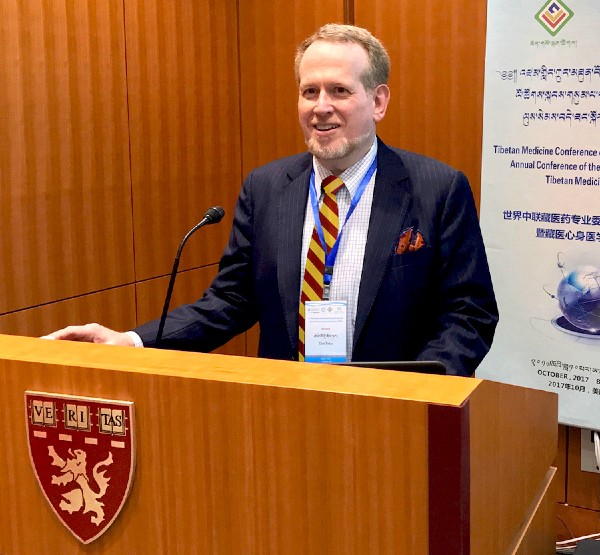
Dr. Tokar presents a paper at the 2017 Tibetan Medicine Conference
on Mind-Body Health at Harvard Medical School, Boston, MA.
Image courtesy of Eliot Tokar
We have already seen how hyper-materialism, human conflict, and a lack of awareness and compassion have affected the world in the 21st century. We are moving ahead rapidly with technology, but too often backward in the state of our civilization. The awful cost of the COVID-19 pandemic must be a wakeup call. If we respond thoughtfully as individuals, nations, and through global cooperation, this crisis can have a positive effect on the future.
There is the potential for increasing ecological, economic, and political crises, but if the COVID-19 pandemic enlightens us to the need for greater wisdom, cross-cultural communication, and love for each other, future crises can be averted or mitigated. The law of cause and effect is a fundamental truth. If we learn from our mistakes, the future can be more favorable. But this requires actions of our body, speech, and mind that motivate activism to improve society, making it more just, compassionate, and stable.
In the end, the laws of nature are purely objective. Nature will always act to create balance. It is up to humans, because of our unique impact on the planet, to determine if that balance will create greater harmony or more destruction.
* Dr. Eliot Tokar: Cultivating Tibetan Medicine in the West (Buddhistdoor Global)
See more
Related features from Buddhistdoor Global
Three Scenarios for Rebirth in the Pure Land in the Medicine Master Buddha Sutra
Medicine Buddha Sadhana: Interview with American Mantra Musician Lee Mirabai Harrington, Part Two
Tracing the Roots of Tibetan Medicine in the United States: The Extraordinary Life of Dr. Keyzom Bhutti
Ritual Readying – Dancing, Healing, and Spiritual Realization, Part Two
More from Coastline Meditations by Nina Müller
See all coronavirus-related content from Buddhistdoor Global














